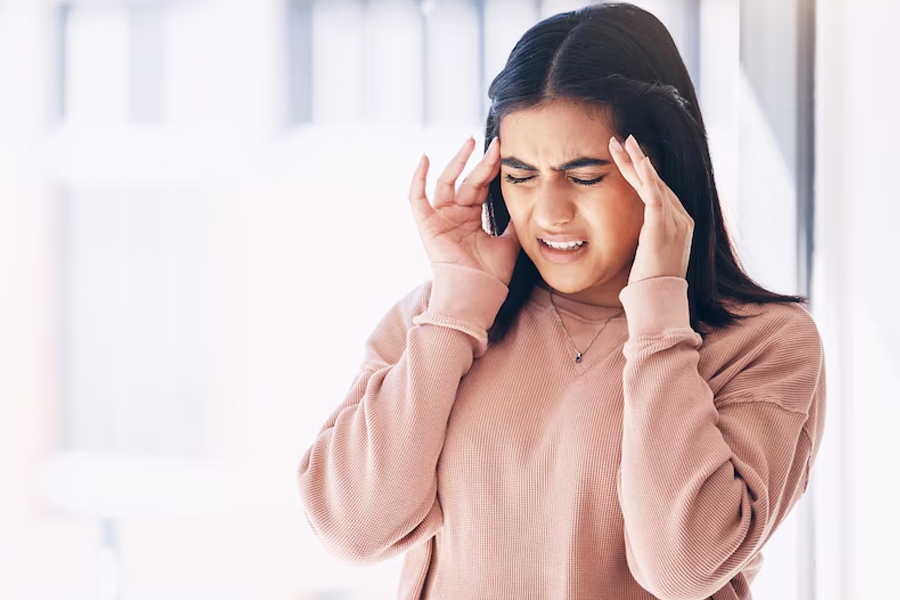
Headaches are common and can occur due to various reasons. It can be attributed to a viral infection, dehydration, sleep deprivation, stress, and excessive screentime. However, what many do not realise is that your nutrient intake can also influence your risk of headaches. This means that certain nutrient deficiencies can lead to headaches, which can be temporary or severe.
Table of Content:-
To know more about the ways to identify nutrient deficiency-associated headaches, OnlyMyHealth spoke to Edwina Raj, Head of Services, Clinical Nutrition and Dietetics, Aster CMI Hospital, Bengaluru, who also shared ways to reduce the condition.
Also Read: Children's Health: How To Reduce The Risk Of Nutrient Deficiency In Picky Eaters
Nutrient Deficiencies That Cause Headaches

Shocking estimates from the World Health Organization (WHO) suggest that more than 200 crore people in the world today are deficient in key vitamins and minerals, particularly vitamin A, iodine, iron, and zinc.
Most of these people belong to low-income countries and are mostly deficient in more than one micronutrient, reports the health body, explaining that the deficiencies occur when people do not have access to micronutrient-rich foods, such as fruit, vegetables, animal products, and fortified foods.
While nutrient deficiencies can lead to various symptoms, headache is a common condition. Deficiencies in specific micronutrients like magnesium, iron, vitamin B12, and vitamin D3 are often linked with headache symptoms, dizziness, and mood disturbances such as low mood and depression, highlighted Raj.
Magnesium, for instance, plays a role in relaxing blood vessels and stabilising mood; low levels can cause vasoconstriction, which can lead to migraines. Iron is necessary for oxygen transport in the blood, and deficiency can result in anaemia, which frequently causes dizziness and headaches. Additionally, vitamin B12 supports nerve health, while vitamin D3 is linked to immune function and mood regulation—low levels of either can increase the risk of headaches and depressive symptoms.
How To Identify Headaches Caused By Nutrient Deficiencies
-1731582301186.jpg)
According to Raj, a qualified dietitian can help identify and address nutrient deficiencies that may be contributing to headaches or other health concerns.
By thoroughly reviewing an individual’s dietary habits, lifestyle, and medication history, the dietitian can evaluate daily nutrient intake and determine if it meets the body’s needs, correlating this with symptoms to identify possible gaps.
By assessing factors such as daily routines, food choices, and medication interactions, a dietitian can gain insight into the underlying causes of nutrient deficiency. Once that is done, a personalised plan can be laid down to reintroduce nutrient-rich foods or recommend targeted supplements to the patient.
There are also specific lab tests available to understand certain deficiencies, and some may be suspected through symptoms or commonly observed in those on prolonged medication, excessive use of laxatives, alcoholism, health conditions, such as kidney or disorder, those on dialysis, and more.
Also Read: How Vitamin A, C, and D Work Together To Transform Your Health: Try Fortified Edible Oils
How To Manage Nutrient Deficiency

A well-balanced nutrient intake through different food groups would be beneficial in maintaining adequate nutrient stores, shared Raj. Focus on adding green, leafy vegetables like spinach and kale, which are packed with vitamins and minerals. Include orange and red produce, such as carrots, bell peppers, and tomatoes, as these are high in antioxidants and beneficial nutrients. Nuts and seeds provide healthy fats, protein, and essential minerals, while beans are an excellent source of fibre and plant-based protein. Whole grains like oats, quinoa, and brown rice add fibre and B vitamins, supporting digestion and energy levels.
However, in cases of severe deficiencies, a short duration of supplements may be prescribed by a doctor or dietitian, which will provide the patient relief from symptoms and prevent any adverse events, she concluded.
Also watch this video
Read Next
BLACKPINK's Jennie Unveils Her Secret To Wellness At 28: Do Cold-Plunges Really Make A Difference?
How we keep this article up to date:
We work with experts and keep a close eye on the latest in health and wellness. Whenever there is a new research or helpful information, we update our articles with accurate and useful advice.
Current Version